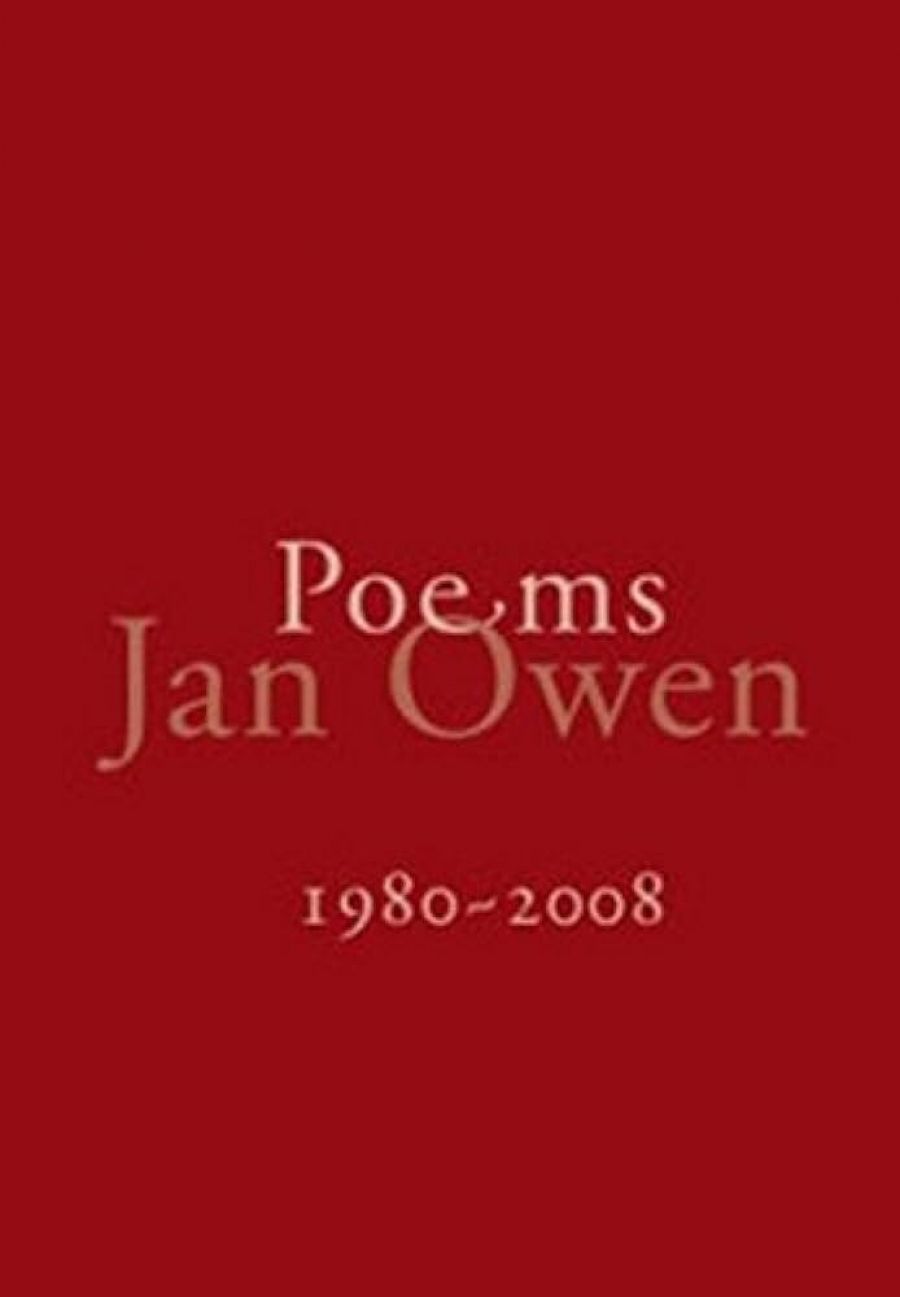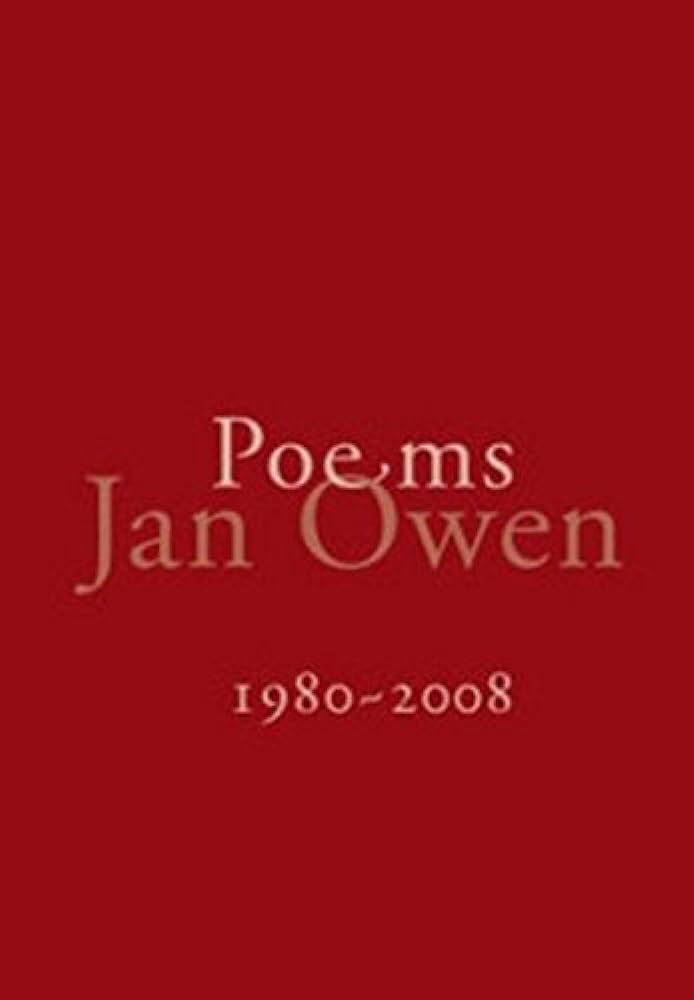
- Free Article: No
- Contents Category: Poetry
- Review Article: Yes
- Article Title: ‘Against the aajej’
- Online Only: No
- Custom Highlight Text:
Poems 1980–2008 selects from Jan Owen’s first five collections and adds eighty pages of new poems. This is an accomplished, playful, intelligent collection which confirms Owen’s status in the front ranks of Australian poets (why is there so little criticism or commentary on her work?). It is full of angels, goddesses, older men, iconic art, imagined sex, strange fruit, flowers, trees, birds, travels through Europe and Asia – encyclopedic ideas and sinuous, crafted language.
- Book 1 Title: Poems 1980-2008
- Book 1 Biblio: John Leonard Press, $29.95 pb, 328 pp
- Book 1 Cover Small (400 x 600):

- Book 1 Cover (800 x 1200):

Angels and spirits inhabit and shadow Poems 1980–2008. It is part of how Owen reads the world: as a lab assistant, librarian and poet: analyse, catalogue, invest in language. Being is permeable, and Owen’s poetry conjures and connects across dimensions. So ‘The Visitation’, from Boy with a Telescope (1986), is ‘a medical photograph … / Six-fingered dwarfism: Amish boy / with Ellis-van Creveld syndrome’, but cast as a Madonna and Child, with Raphael in attendance. ‘Anima’, from Night Rainbows (1994), imagines a son’s nightmarish wraith as a kind of demonic moth ‘like a grey-furred embryo under a doll’s umbrella /… / soft as the pubis of an elderly angel’. Later in this volume, a very human Mary, in ‘This Marriage’, claims back her sexual body from the angelic annunciation, letting ‘the blue gown … slip to a pool’ as she gives herself to Joseph.
The title of the section containing the new material, ‘Laughing in Greek’, comes from near the middle of the longest single poem in the book, ‘Travelling Towards Evidence’: ‘laughing in Greek, / you mix the words for want / and love and like; / all journeys nest like Russian dolls / or strike footloose / through no-man’s-land.’ This complex poem explores the search for meaningfulness, winding through images and fragments of belief: ‘We start with nothing / but darkness older than bone / ... / glimpsiest chiffon of God’; and experience: ‘friends of a day can enter your breath.’ Although Owen’s ‘I’ rejects the role of guide, the poem points to moments of brightness, recalling Kenneth Slessor’s beach in ‘Five Bells’: ‘Look – two kingfishers, / there in the camphor laurel’; and a haunting sense of failure and difficulty: ‘To advance with a knife / against the aajej / cuts short the miles to Babylon.’ The poem travels through Petra’s ‘rose red stone’, the Paris Metro and Australia’s detention centres, seeking an imaginative pattern for ‘our torn race’. Inevitably, though, Owen’s Taoist epigram underscores the poem’s unfinished search: ‘You think you can improve the world? / I do not think it can be done.’ Nature is Owen’s alembic: the particular subject or focus is part of a series of intersecting awarenesses – memories and mythologies – and often the dark is more to be trusted than the light. Doubt and the devil are more certain than certainty: ‘the anti-lyric works miracles too; / even belief / must wear the cloak of another’s doubt.’
And yet Owen’s poems hang on to, celebrate, interrogate the existential beauties and pains of the natural world. Many focus on moments of lyric or comedic or intellectual exhilaration: as an example, from ‘Honesty’: ‘I am simply the shortest distance / between two seeds’; or from ‘Eating Durian with Chandra, Malaysia, 1997’, ‘the taste’s / like garlic custard in a urinal … / … or creamy sex / on the cunning tongue.’ The suggestive title of ‘Little Lust Poem with Quinces’ indicates its playfulness. More serious, though cut with irony, is ‘The Bite’, in which a young girl’s sense of (herself as) forbidden fruit is in terms of the lychee’s ‘succulent pearly flesh, / the white shadow valley between her new-moon breasts’.
On the one hand, ‘There is / a wholeness to almost anything’ (‘Scent, Comb, Spoon’) so that ‘Even the might-have-been returns’. Objects, people, experiences, ideas are never ends in themselves, desired or deferred to by the poem. There is no ‘reality’; it is language, especially poetry, that instantiates the teasingly beautiful agnosticism where pattern is the best you can hope for and perhaps the best: ‘is this all resurrection means, / a flicker of cells, a taste for symmetry?’ As ‘Shifting the Dark’ has it: ‘I shine therefore I am’. On the other hand, the poet struggles, as in ‘Boat Harbour Beach’: ‘I’m hacking into words on a page.’
Like language, which may ‘despair of us’, art offers consolation, delight and mischief in Owen’s poems (see the justly celebrated wit and sensuality of the interrogation of painting in ‘First Love’, or the play with netsuke-carving in ‘White Event’). In ‘Brass’, Owen uses David’s portrait of Jacobus Blauw (1795) to meditate on la condition humaine: ‘the many musics live in us, we are their haunted house / but art’s more like its own back door, a threshold / almost crossable … / … The way a picture or a woman / asks you in yet gathers intensity to frame a slight distrust.’ Suggesting that ‘Inexpressible unlikelihood’s the bottom line’, the poem concludes there is only ‘the art of here, the music of now’.
Owen writes with delicacy and strength, passion and intellect, in formal and free modes (see her delight in the sonnet form). John Leonard Press is to be congratulated for publishing yet another high quality and imaginatively satisfying collection.


Comments powered by CComment